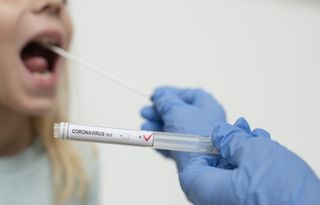When will we be out of lockdown? Four ways the UK lockdown could be lifted
It's not going to be easy...

The UK has been in a state of lockdown since 23rd March, as a response to the coronavirus pandemic.
And on the 16th April, the original three-week lockdown was officially extended by the government.
But since then, discussion has been rife about when and how the lockdown will eventually be lifted.
Extension of lockdown UK - has the lockdown been extended in the UK?
On 16th April, stand-in PM Dominic Raab, who was leading the government during Boris Johnson's absence, confirmed an extension to the lockdown. He explained that the lockdown will continue for three weeks "at least", as the country continues to battle against the virus.
Dominic Raab revealed then that the government cannot begin to lift the lockdown yet, as it could risk a resurgence of the coronavirus. He explained during the daily briefing, "If we rush to relax the measures that we have in place we would risk wasting all the sacrifices and all the progress that has been made.
"That would risk a quick return to another lockdown with all the threat to life that a second peak to the virus would bring and all the economic damage that a second lockdown would carry."
When will the UK lockdown be lifted?
The Prime Minister's deputy explained that we can not consider lifting the lockdown until five things have happened.
GoodtoKnow Newsletter
Parenting advice, hot topics, best buys and family finance tips delivered straight to your inbox.
Five criteria for lifting lockdown
- The first vital step, is making sure the NHS can cope with any increase in cases
- There also needs to be a "sustained and consistent" fall in the daily death rate - which is currently plateauing, but not falling.
- Dominic Raab also said that we would need to see evidence that the rate of infection was decreasing to "manageable levels"
- They also needs to be general confidence that any changed measures would not risk a second peak of the virus.
- And vitally for the NHS, there needs to be an increased supply of COVID-19 tests, and a Personal Protective Equipment (PPE) supply that can continue to meet demand for medical staff.

Considering that we have not yet hit some of these targets, it appears important that the UK lockdown continue for the foreseeable future.
When will we be out of lockdown? The different ways that we could make a return to normal life
Government ministers, including the new Labour leader Keir Starmer, have recently called for an exit strategy to be revealed to the public. And many health experts have asked for the same. Professor Karol Sikora, an oncologist and ex-director of the WHO cancer programme, said, "I understand the Government's caution - the lockdown has worked.
"But people need to be able to see a clear exit strategy. Planning for a gradual, phased and monitored loosening of restrictions will give people the reassurance that this won't go on forever."
However, it's thought that the government do not want to undermine the very crucial 'stay home' message, by discussions of the future. Dominic Raab also noted that it was not right at this stage to 'prejudge' what the scientific advisers to the government would suggest over the next three weeks.
However, some experts have been speculating on how and when we could make a gradual return to normal. There is no doubt that any return will need to be slow and gradual, with measures lifted carefully and certainly not all at once. So what are looking like our likeliest options?
Mass testing
Officials have long said that testing, testing, and more testing, is what's needed to get a hold on the virus. Testing means that we can track the spread of the virus - seeing who has it and who they may have given it to. Antibody tests - which diagnose whether you've ever had the virus, and therefore are likely to be immune to it going forward - could also be a crucial way of escaping lockdown.
For example, if tests found that a large number of the UK population had already had the virus, lockdown measures could be eased off. The director general of the World Health Organisation (WHO), Tedros Adhanom Ghebreyesus stated the importance of testing, saying, “We cannot stop this pandemic if we do not know who is infected.”

Jeremy Hunt, the former Health Secretary also said that aggressive testing and isolation has been vital for countries like Singapore and South Korea, in keeping businesses and the economy going.
He said, "If you look at what's happening in South Korea and Singapore, they've managed to keep their offices, shops, restaurants open. But they do that by having a mass programme of testing - so anyone with symptoms is tested, everyone they’ve come into contact with is tested, and you can keep on top of the virus."
However, at the moment, UK testing is reported not to be meeting its set targets. Matt Hancock earlier this month pledged that the UK would complete 100,000 tests a day by May, but the BBC's political correspondent Jessica Parker claims that only 18,665 were carried out in the last 24-hour period.
The young, healthy and immune to leave lockdown first in a staggered return to normality
A group of economists at at the University of Warwick's Department of Economics recently published a paper suggesting that one way to slowly come out of the lockdown could be to let young and healthy people out first, to help kick-start the economy again.
They suggested that 20-30 year olds who don't live with their parents could return to society, as a way of breaking the lockdown initially. However, they did note that this method could result in 630 avoidable deaths.
They argued that young people are "substantially safe" from the virus, but accepted that doing this "would not be costless in human suffering and pressure on the National Health Service."

There are also arguments that letting those who have had the virus - and are therefore likely to be immune to it - out first, could be another way to break the lockdown. They may even be issued with immunity certificates, to prove they are safe to continue with normal life.
A vaccine
Of course, one option is maintaining some form of lockdown until a vaccine is found. In fact, many experts have said that a vaccine is the one and only way out of this pandemic.
Professor Neil Ferguson, the Government's key epidemiologist, told The Telegraph, "The only exit strategy from this long term, is vaccination or some other kind of innovative technology."
MORE: How to make a time capsule with your children that tells the story of Covid-19
A vaccine is the only likely way of protecting healthy people against the disease. However, many experts believe that a vaccine may not be found for another year and a half, and even then, key workers and the most vulnerable will be the first to receive it.
Keeping the UK in full lockdown until next year would be an extreme prospect, but many think that completely normal life, as we knew it before the pandemic began, can only fully resume at this point.
Continued social distancing with a view to reaching herd immunity
Many believe that incorporating continued social distancing into our daily lives is one way to return to a semblance of normality.

Professor Ferguson said, "I should say, it's not going to be going back to normal. We will have to maintain some level of social distancing, a significant level of social distancing, probably indefinitely until we have a vaccine available."
Professor Karol Sikora, who has been outspoken during the COVID-19 crisis, and praised by many for his measured and positive explanations on Twitter, said to reaction life that starting small is the way to begin easing the lockdown. He said, "Allowing small businesses and shops to open is the first thing. And then see what happens. Measure the incidence, but still keep the older people and the people with illnesses semi-secluded. And then gradually open it up. Follow the rate of infection in the community."
He continued, explaining, "If it’s true that lots of people have actually already been infected, then we’ll get to herd immunity. When 60 per cent of the population has been infected, the virus has nowhere to go."
Amy is Senior Digital Writer across Woman & Home, GoodTo and Woman, writing about everything from celebrity news to health, fashion and beauty features. When she isn't obsessing over the latest dress drop from Marks & Spencer, you'll most likely find Amy out running, or with a cup of tea in hand ready to dive into a gripping new Netflix series.
-
 Why do babies need to lie flat in a pram?
Why do babies need to lie flat in a pram?Wondering why babies need to lie flat? Experts reveal all — plus whether or not a baby should sleep in a pram
By Charlotte Duck Published
-
 The 3 stages of play every parent needs to know to save their sanity (and you're probably nailing #2)
The 3 stages of play every parent needs to know to save their sanity (and you're probably nailing #2)By Dr Amanda Gummer Published